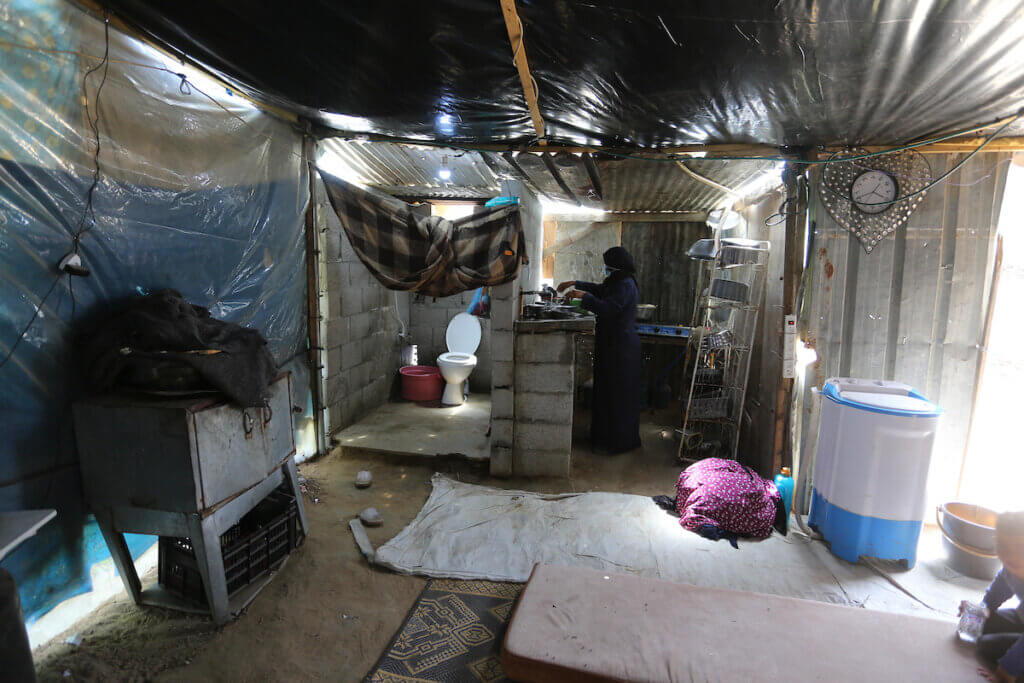Editor’s Note: The following is this week’s edition of our Special Coverage: COVID-19 newsletter. To receive it every week sign up below:
The Latest:
- 435,412 Palestinians tested positive for COVID-19; 405,102 recoveries; 4,388 deaths
- Of those who tested positive, 234,863 live in the West Bank, 170,193 live in Gaza, 30,356 live in East Jerusalem
- 1,285,570 Israelis tested positive for COVID-19; 1,232,292 recoveries; 7,766 deaths
Like many economies, we know Gaza’s plummeted during the first year of the pandemic as borders closed, manufacturing shut down, and employees were laid off. A new analysis from the United Nations Conference on Trade and Development, or UNCTAD, said in a report late last month something we weren’t expecting: the drop in 2020 was the same exact rate of decline Gaza experienced in 2019. In fact, Gaza’s economy has been shrinking more or less its pandemic rate since 2016.
That’s quite a pronouncement to take in.
“For decades, the Palestinian people have been locked down one way or another and restrictions on mobility and economic activity have been part of their daily reality,” the report said.
The big picture: In effect, what the world has been going through for the last 18 months, is what Gaza has been experiencing for a long time. To put numbers to it, Gaza’s GDP contracted 13.7% in both 2020 and 2019.
“Persistent extreme levels of unemployment” have led many to resort to “coping strategies that may entail long-term costs, including using poorer food substitutes, selling valuable assets, returning to subsistence agriculture, reducing investments and using inferior inputs,” the report said.
The term “inferior inputs,” refers to energy. Things like hospitals running on generators, families using candles to light their houses.
Worst year since after the creation of the Palestinian Authority
To explain how this happened UNCTAD clarified, 2020 was indeed an especially bad year for Palestinians. It categorized it as the worst year after the creation of the Palestinian government in 1994. Overall the economy contracted by 11.5%, with the most devastating losses occurring in the summer when the GDP fell by 18% and two-thirds of businesses closed.
The Palestinian economy is dependent on foreign aid and the public sector, although manufacturing and agriculture are sizeable employers. When those shutdown, over 230,000 were laid off from work inside the West Bank and Gaza, and another 34,000 who crossed into Israel or the settlements each day also lost their jobs. This soared unemployment in Gaza to 46.6%, or about the same as Syria in 2016—the deadliest year for children in the civil war.
Comparatively, the West Bank experienced a more moderate unemployment rate of registering 18.2% by November 2020, but there is some smoke and mirrors to the numbers. Even with lockdown policies, Palestinians still worked inside of Israel for most of the pandemic. UNCTAD found that “obscured the fact that without employment in Israel and settlements, in the West Bank would have been higher by about 16 percentage points, much closer to its extreme levels in Gaza.”
The average daily wage in Gaza is a paltry $18 and in the West Bank it’s $37. Wages average almost double in Israel and settlements, at $78 per day. UNCTAD said this “distorts the domestic economy and undermines its competitiveness.” Meaning, skilled labor is drained out of the Palestinian economy to the Israeli economy, and over time, this has created a “reservoir of cheap labour” for Israel, while “depriving” the Palestinians of a “large number of skilled and semi-skilled workers.”
At the same time, there were all sorts of machinations on the political front that culminated in massive losses. In a row that was spurred after Israel declared intent to annex part of the West Bank and Palestinians vowed to boycott the funds, “The suspension triggered a fiscal crisis that deprived the [Palestinian government] of 68% of its fiscal revenues for half the year until the transfer of funds was resumed in November [of 2020],” UNCTAD said.
By the close of the year, in the West Bank Israeli forces had seized or demolished 848 Palestinian properties, and settler violence actually peaked despite strict shelter in place orders.
“Recovery in 2021 and beyond hinges on actions that will be taken (or not) by the occupying power and the scale of donor support,” the report said. With the events of last May still fresh in our minds, we’re thinking 2021 might end up being Gaza’s most consequential year ever.
Updated: October 3, 2021 at 11:38 a.m.



Re Gaza some quotes from Sylvain Cypel’s recently published “The State of Israel vs. The Jews”:
Page 67 – “These sentiments were echoed in 2012 by Ariel Sharon’s son Gilad Sharon, who wrote ‘We need to flatten entire neighborhoods in Gaza. Flatten all of Gaza. The Americans didn’t stop with Hiroshima – the Japanese weren’t surrendering fast enough, so they hit Nagasaki too…There should be no electricity in Gaza, no gasoline or moving vehicles, nothing.’ ” (references given)
https://www.scmp.com/news/world/middle-east/article/2140800/no-innocent-people-gaza-israeli-defence-minister-avigdor (2018, italics mine)
“Israeli Defence Minister Avigdor Lieberman said on Sunday there were “no innocent people” in the Hamas-run Gaza Strip after days of protests and clashes left 30 Palestinians dead, including a journalist.”
I just re-read an essay by James Zogby from 2019. He describes meetings he went to, a couple of decades ago, about supporting the Palestinian economy. A young American showed up who had a grant to teach entrepreneurial skills to the Palestinians. They were furious. They know how to do business – but Israel won’t let them. Won’t let them import, or export, or compete in any way with Israeli businesses, and everything has to go through Israel. Even the US government couldn’t get Israel to move. Of course, it’s far worse now.